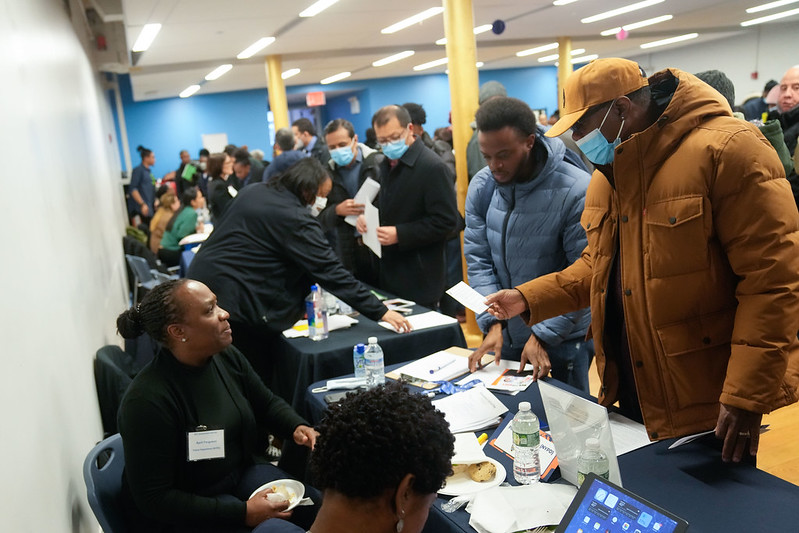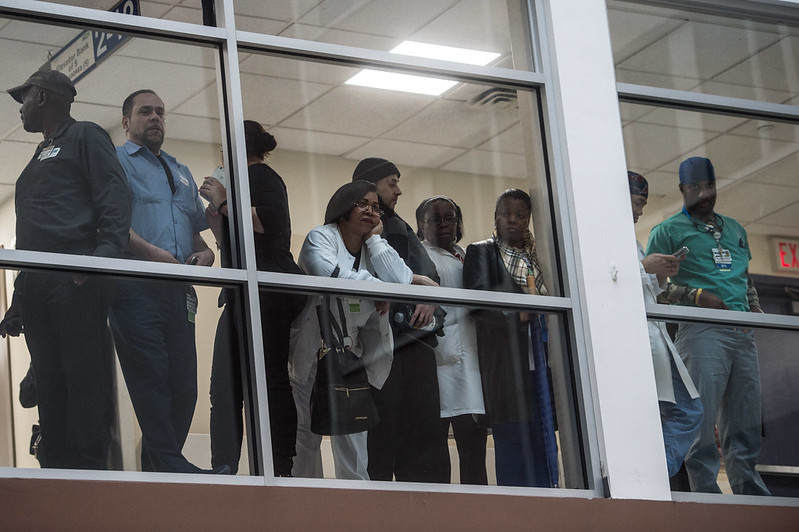Now is New York’s Time to Pass The Clean Slate Act

Seeking opportunity (photo: Michael Appleton/Mayor's Office)
This year, New York has an opportunity to move away from perpetual punishment by passing the Clean Slate Act, legislation aimed at erasing the scourge of a criminal record by providing for automatic sealing of prior misdemeanor and felony convictions after a waiting period.
The challenges that a conviction can pose for those seeking to reintegrate into society following involvement with the criminal legal system makes passing Clean Slate essential.
A criminal record is just one of the many consequences that can flow from interaction with the criminal legal system, but it carries with it outsized importance. Criminal records too often have the effect of marking the bearer as a second-class citizen unable to move beyond the label of criminal. They can prevent those who have paid their debt to society from obtaining what they need to move beyond their past: housing, employment, and education.
The challenges posed by a criminal conviction for those working to secure housing provides a helpful example. According to the Fortune Society, a 2015 report showed that over half of New York City landlords who are aware that an applicant has a conviction would not even allow that applicant to view a rental property. That forces people to invest inordinate time, energy, and resources into their housing search. They must apply countless times, incurring fees to pay for applications, background checks, and credit reports until they are met with success. This process does more than just upend their finances. Without the stability that comes with a permanent home, it is more difficult to find and maintain employment, or secure educational opportunities for their children.
Consistent with the range of harms that the criminal system visits on its targets, the problem with criminal records is widespread and disproportionately burdens Black and Latino New Yorkers. More than 2 million New Yorkers are burdened by prior convictions. The racial dynamics make these numbers even more troubling.
A 2020 report of arrests and sentences by the New York State Division of Criminal Justice Services noted that people of color made up 73% of people with prison sentences, with Black and Latino people making up 48% and 23%, respectively. While these numbers only indicate the racial breakdown of the prison population in 2019, they indicate that there is a massive disparity among people living with convictions, particularly those living with felony convictions. A separate report by the Data Collaborative for Justice at John Jay College showed that roughly 80% of people in New York City with conviction records for misdemeanors and felonies are Black or Latino. No matter how we look at it, these convictions create a substantial barrier to reentry for Black and Latino New Yorkers.
The Clean Slate Act is responsive to these concerns. It is a broadly supported bill that will allow people who remain conviction-free to seal prior misdemeanor convictions after three years and felony convictions after seven years. The automatic sealing of these prior convictions will remove the barriers that far too many New Yorkers face in accessing the resources they need to successfully move forward with their lives after justice involvement, providing relief for approximately 1.4 million New Yorkers when it goes into effect. And it will advance racial justice by addressing a harm — the existence of a criminal record — that disproportionately burdens New Yorkers of color.
The legislation could also have immediate economic benefits for the state. By removing barriers to employment for New Yorkers with convictions, Clean Slate stands to yield up to $7.1 billion in annual increased earnings for New Yorkers. That revenue could help expand the state’s economy, and allow for investments in infrastructure, the environment, and other priorities that will improve the quality of life for all New Yorkers.
Last year, at a rally in support of Clean Slate, State Senator Zellnor Myrie, one of the bill’s sponsors, said, “The biggest crime-fighter we have is opportunity. It’s jobs, it is housing, it’s stability, all of the things we want our communities to be filled with.” That is emphatically true. Passing Clean Slate, making it the law of New York, will revitalize our communities and give countless people a fair and real shot at moving forward with their lives. Now is the time to pass Clean Slate.
***
Vincent M. Southerland is an Assistant Professor Clinical Law at New York University School of Law, where he teaches the Criminal Defense and Reentry Clinic, a seminar on race and the criminal system, and co-convenes a colloquium on race and inequality. On Twitter @vmsoutherland.
***
Have an op-ed idea or submission for Gotham Gazette? Email This email address is being protected from spambots. You need JavaScript enabled to view it.
Moms (Like Me) Deserve the Credit

Thumbs up (photo: Michael Appleton/NYC Mayor's Office)
New York’s proposed Working Families Tax Credit has the power to lift up millions of mothers – it's time for Albany to pass it.
I am a single mother of four children between the ages of 5 and 17, all born and raised in New York just like me. I work extremely hard for my family each and every day. Like many mothers, I take my children to doctor’s appointments and the grocery store, help them with their homework, and much more. I have worked my way up to a management position at Wendy’s, a position I am very proud of. Despite this, I have not always made enough to make ends meet, making it harder to support my kids, further my career, and contribute to my community.
And I’m not alone. Women in this country work hard for little pay and little support.
That’s why, when the federal government enhanced the Child Tax Credit, it was a much-deserved lifeline for families. It provided hundreds of dollars to families like mine every month. When you've been living paycheck to paycheck, that help meant not having to choose between paying bills, paying rent, and putting food on the table. In short, it changed my life, and it helped me provide for my children.
Unfortunately, the federal government chose not to renew that enhancement, and families like mine will be forced back down into poverty unless New York State takes action on our behalf.
There is a bill in Albany that would do exactly that: The Working Families Tax Credit (WFTC), led by Senators Gounardes and Cooney and Assemblymember Hevesi, could give my family what we need to keep going. The WFTC bill includes children 0-4 years of age for the first time, includes tax-filing families regardless of citizenship status, and eliminates the phase-in, providing those with the lowest income the largest credit.
The bill also increases the credit provided to all families to a maximum credit of $1,500 per child, provides a minimum $500 credit per child regardless of income, and eliminates the cap on the number of children eligible to receive a credit.
The data proves this makes sense. When Child Tax Credit programs are in place, moms use them to pay for childcare, food, clothing, and other basic needs. This is crucial given that the gap in childcare options, specifically, is one of the single biggest obstacles when participating in our economy.
Studies from the Center on Budget and Policy Priorities (CBPP) and Urban Institute and Humanity Forward also show that direct cash benefits like the federal Child Tax Credit help moms – especially single mothers – get back to work by alleviating the costs of childcare and transportation.
I am dedicated to taking care of my children and providing them with the best possible life, but I didn’t get here on my own: I got on my feet with the support of organizations like Healthy Moms in Rochester, Up Together, and Flower City AmeriCorps, and with the help of programs like the Child Tax Credit. Now, I am also working on my career by taking adult literacy classes at the Hart Street OACES and I’m proud to share that my son will be starting his first year of college – the first to go to college in our family.
Since the enhanced Child Tax Credit expired, however, my paychecks haven’t gone as far. Without it, every day is more stressful. When families like mine are given resources directly, we reinvest our time and our efforts to make our communities better, safer places for our children. New York should pass the Working Families Tax Credit — moms just like me all over the state deserve the credit.
***
Candace Cabral is a born-and-raised New Yorker and a mother of four. She lives and works in Rochester, New York.
***
Have an op-ed idea or submission for Gotham Gazette? Email This email address is being protected from spambots. You need JavaScript enabled to view it.
Undoing the Medicaid Pharmacy Benefit Carve-Out Before It’s Too Late

Seeking health care (photo: Michael Appleton/Mayor's Office)
Over the past three years, New York has been the epicenter of a global pandemic, seen the outbreak of mpox, a reemergence of polio, and recently experienced spikes in flu, COVID, and RSV. Currently, an unprecedented number of asylum-seekers are looking to New York City and its safety-net health-care providers for care.
Come April 1, the state will face another potential crisis, as 7 million New Yorkers will have to undergo a difficult and error-prone process of recertification for Medicaid for the first time since the beginning of the pandemic. A study from George Washington University estimates that more than 180,000 New York Medicaid recipients could lose coverage starting July 1. This loss of coverage will put lives in jeopardy and undermine Governor Hochul’s commitment to advancing health equity.
Despite all this, the state is proceeding with a radical change in how drugs are paid for in the Medicaid program. Moving the Medicaid pharmacy benefit out of Medicaid managed care plans and into the state-administered fee-for-service program will eliminate drug manufacturer discounts to safety-net health centers that are used to fill gaps in care. The timing is stunningly bad.
The pharmacy benefit carve-out will strip providers of the very funding they use to care for those who may lose their insurance during recertification. The carve-out must be repealed and replaced with a new alternative plan.
Historically, safety-net health providers have filled in gaps in coverage by using revenue from the 340B drug discount program to continue to see patients while their recertification issues are resolved, provide care to undocumented New Yorkers, and more.
The revenue from 340B drug discounts will play a vital role in ensuring continuity of care throughout the Medicaid recertification process and in helping serve the influx of migrants New York is now seeing. Given this, it is extremely troubling that Governor Hochul is proceeding with the Medicaid pharmacy benefit carve-out.
This policy will strip safety-net clinics serving 2.3 million New Yorkers of more than $310 million in annual funding by removing the pharmacy benefit from Medicaid managed care. It would also fundamentally change how Medicaid recipients access their pharmacy benefit, causing certain disruption for patients.
California implemented the pharmacy carve-out last year, and the results were disastrous. Patients faced life-threatening delays in accessing their medications, and providers are currently fighting for the distribution of funds to offset their lost drug discounts that were promised 12 months earlier.
The carve-out will also exacerbate the very inequities in our healthcare system that Governor Hochul has pledged to address. Under this proposal, more than 15,000 New Yorkers who are members of HIV Special Needs Health Plans will lose access to a tailored formulary and specialty pharmacists with experience in HIV, mental health, and gender-affirming care who use data in real time to resolve problems. This impact would be especially felt in LGBTQ+ communities and communities of color.
To complicate things further, the State Department of Health is under new leadership and faces unprecedented staffing vacancies and turnover. It is impossible to imagine they’ll be able to take on the carve-out and recertification, in addition to an ambitious public health agenda, without missteps that lead to New Yorkers losing coverage.
Thankfully, legislation has been introduced that would achieve the state’s policy objectives for the carve-out, including protecting community pharmacies from Pharmacy Benefit Managers (PBMs), while averting disruption to Medicaid beneficiaries, preserving the safety net, and saving the state money. This alternative legislation keeps the pharmacy benefit in Medicaid managed care and, in doing so, maintains the 340B drug discount mechanism that providers rely on. Creating an approach that protects safety-net providers while also protecting small pharmacies from PBMs is critically important.
By forging ahead with the carve-out, the state is making the already challenging recertification exponentially harder and putting lives at risk. As we’ve jumped from one public health crisis to another, a strong network of safety-net providers has been there protecting vulnerable New Yorkers. A perfect storm is brewing: recertification, a migrant crisis, and a financial crisis for safety net providers. Now is not the time to proceed with the pharmacy benefit carve-out.
***
Assemblymember Linda Rosenthal represents parts of Manhattan. On Twitter @LindaBRosenthal.
***
Have an op-ed idea or submission for Gotham Gazette? Email This email address is being protected from spambots. You need JavaScript enabled to view it.




